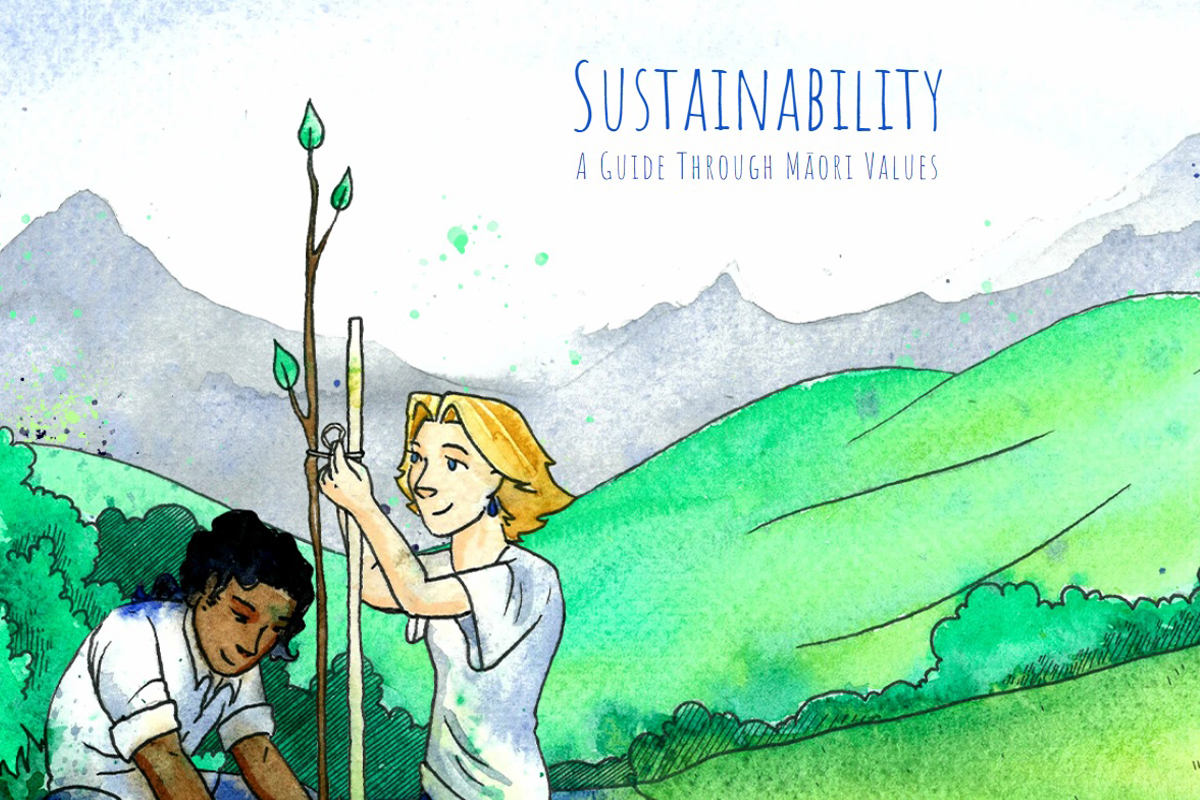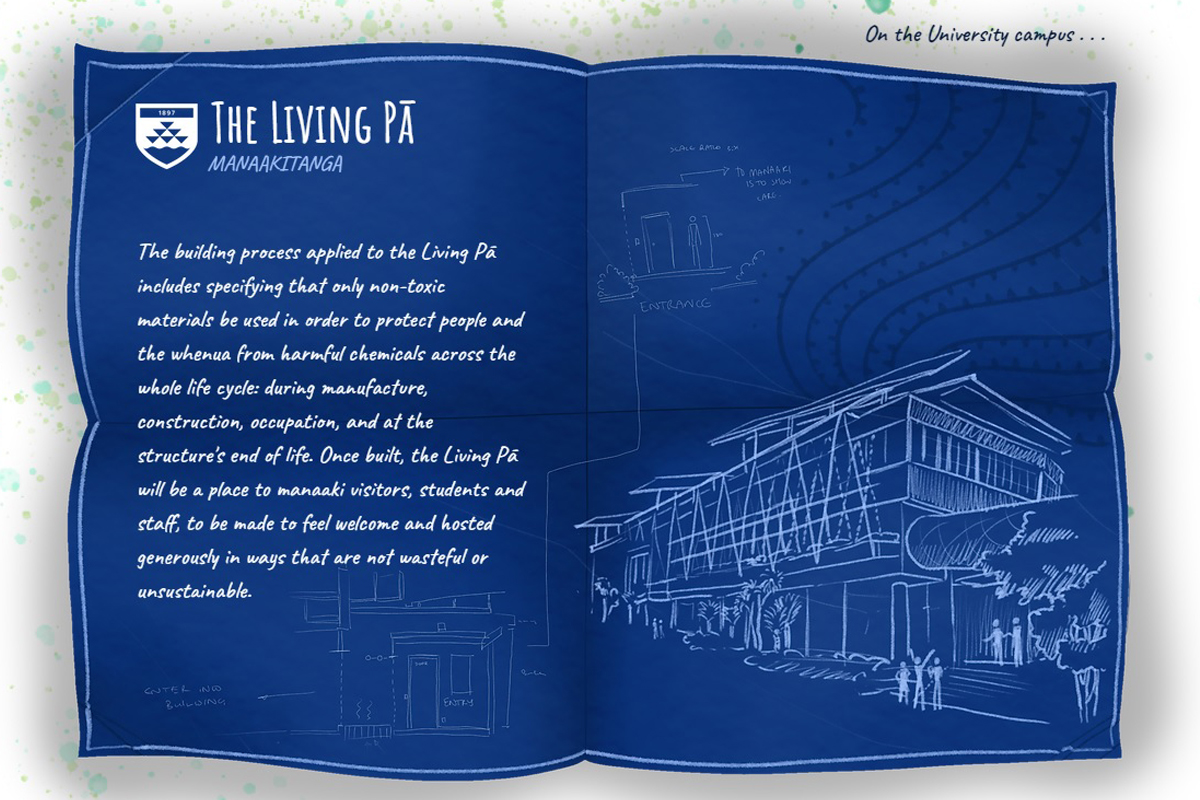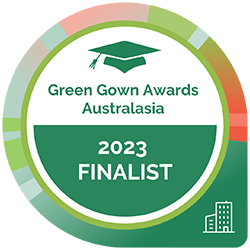Diversity, Equity & Inclusion in Sustainability category
There are strong synergies between Māori values and western sustainability concepts. Many sustainability advocates also want to champion Māori culture, while utilising and growing Mātauranga Māori (Māori knowledge). Māori values are frequently acknowledged in sustainability work, but the practicalities of how to live those values in our everyday activities can still be challenging for many pakeha (non-Māori). The ‘Sustainability Guide Through Māori Values’ project was developed to provide a fun user-friendly resource to help the University community engage with Māori and understand how they can demonstrate through values through sustainable actions.
This project contributes to the University’s delivery of both Mai i te Iho ki te Pae (Māori Strategic Outcomes Framework) and Te Parahia (Sustainability Outcomes Framework).
The project was developed by way of the Summer Research Scholarship Programme and was ultimately a collaborative endeavour involving a student, academic staff, and University administrators. The project was managed through the co-supervision of Senior Lecturer in Sustainable Design, Tonya Sweet (School of Design Innovation) and VUW Director of Sustainability, Andrew Wilks. A talented third-year Design student, Jenny Gatehouse, was selected to develop the illustration and animation assets, as well as to build the website. Additional support on the project included oversight of the articulation of Māori values by Assistant Vice-Chancellor (Mātauranga Māori), Meegan Hall (Ngāti Ranginui & Ngāti Tūwharetoa) , guidance on the generation of imagery by Senior Lecturer in Māori Design, David Hakaraia (Ngāpuhi and Ngāti Paoa), and assistance by Senior Advisor for the Living Pā and PVC Māori, Rhonda Thomson (Poutini Ngāi Tahu). Collaborations across students, academic staff, and administration are a rare occurrence within the institution, and the co-design process pursued in the development of this project is in itself unique and resulted in a highly unique output.
The final product of this collaboration – a user-friendly, multi-media website accessible via the University’s Sustainability homepage – illuminates seven Māori values according to their alignment with Western concepts of sustainability including: manaakitanga, whakapapa, whanaungatanga, mōhiotanga, kaitiakitanga, mauri, and whai mātauranga. The communication of these values is delivered according to a four-part structure that facilitates diverse pathways to understanding, engagement, and appreciation: (1) A definition of each value is provided to support comprehension; (2) A invitation for enagagement within the context of everyday life is offered under the heading, “Your part to play”; (3) An animation is provided to bring each invitation for engagement to life for the viewer; and, (4) Each value is highlighted as it is or will be applied to the University’s Living Pā project (a redevelopment of the University’s marae precinct, which is currently in construction and designed to meet Living Building Challenge certification). Taken as a comprehensive whole, the website enables an entrypoint for the University community and external visitors to expand their knowledge about sustainability within the context of Mātauranga Māori, explore opportunities to utilise these values in their personal lives, and celebrate the ways that the University is implementing these values on campus.
Since its publication in May 2023, the website has had hundreds of views, including visitors from within the University community as well as garnishing international access.

Environmental and social benefits
Four primary benefits have been identified resulting from this project:
- The website functions as an engaging educational tool that directly supports environmental and social sustainability goals.
- The unique approach applied to this educational tool invites and celebrates cultural engagement with broad concepts of sustainability.
- The accessibility of the website affords outreach to the whole University community and beyond for a wide (national) audience
- The project supported valuable learning outcomes for the design student involved, as well as supporting cross-disciplinary co-design engagement amongst various staff across the University.
Leadership and engagement
The distinctive attributes of this proposal include the following:
- The proposal reflects a unique approach to supporting comprehensive sustainability education. No other equivalent resource is currently available that provides a practical guide to integrate Māori values with sustainability concepts.
- The proposal leverages and highlights the synergistic ethos of the Living Pā project as an exemplar for how the institution is enacting the values introduced.
- The proposal showcases a bespoke and engaging multi-media web-tool that is the outcome of a robust cross-disciplinary co-design process.
- The proposal reflects the opportunities and challenges in navigating sensitive cultural nuances in communicating sustainability concepts through a Māori lens.
Significance to the sector
- No other Universities have provided a resource like this;
- Increasingly NZ Universities are emphasising the connection to Māori values in their sustainability work but the emphasis is more on strategy and governance, rather than practical guides.
Wider societal impact
Increasingly pakeha are looking for ways to become better Treaty partners as our society matures. While we still have a long way to go, this resource helps with cross-cultural communication and understanding, by de-mystifying Māori values.
This resource will increase understanding of Māori values amongst sustainability champions, while also increasing engagement with sustainability action among Māori – availing both angles increases the audience and impact.
Learner/Graduate employer impact
Cultural competencies are desired by employers, so the web-tool will be a valuable resource for students in developing these skills and knowledge areas. Furthermore, employers can reference the tool themselves as a point of information or as a reference in evaluating how their values align with sustainability.

Top 3 learnings
Category finalists
Diversity, Equity & Inclusion in Sustainability
Diversity, Equity & Inclusion in Sustainability
Diversity, Equity & Inclusion in Sustainability/Winners
Diversity, Equity & Inclusion in Sustainability/Winners
Past winners
Benefitting Society/Winners
Benefitting Society/Winners
Diversity, Equity & Inclusion in Sustainability/Winners
Diversity, Equity & Inclusion in Sustainability/Winners
Climate Action/Winners
Climate Action/Winners
Sustainability Institution of the Year/Winners
Sustainability Institution of the Year/Winners
Creating Impact/Winners
Creating Impact/Winners
Creating Impact/Winners
Creating Impact/Winners
Top 3 learnings
Diversity, Equity & Inclusion in Sustainability category
There are strong synergies between Māori values and western sustainability concepts. Many sustainability advocates also want to champion Māori culture, while utilising and growing Mātauranga Māori (Māori knowledge). Māori values are frequently acknowledged in sustainability work, but the practicalities of how to live those values in our everyday activities can still be challenging for many pakeha (non-Māori). The ‘Sustainability Guide Through Māori Values’ project was developed to provide a fun user-friendly resource to help the University community engage with Māori and understand how they can demonstrate through values through sustainable actions.
This project contributes to the University’s delivery of both Mai i te Iho ki te Pae (Māori Strategic Outcomes Framework) and Te Parahia (Sustainability Outcomes Framework).
The project was developed by way of the Summer Research Scholarship Programme and was ultimately a collaborative endeavour involving a student, academic staff, and University administrators. The project was managed through the co-supervision of Senior Lecturer in Sustainable Design, Tonya Sweet (School of Design Innovation) and VUW Director of Sustainability, Andrew Wilks. A talented third-year Design student, Jenny Gatehouse, was selected to develop the illustration and animation assets, as well as to build the website. Additional support on the project included oversight of the articulation of Māori values by Assistant Vice-Chancellor (Mātauranga Māori), Meegan Hall (Ngāti Ranginui & Ngāti Tūwharetoa) , guidance on the generation of imagery by Senior Lecturer in Māori Design, David Hakaraia (Ngāpuhi and Ngāti Paoa), and assistance by Senior Advisor for the Living Pā and PVC Māori, Rhonda Thomson (Poutini Ngāi Tahu). Collaborations across students, academic staff, and administration are a rare occurrence within the institution, and the co-design process pursued in the development of this project is in itself unique and resulted in a highly unique output.
The final product of this collaboration – a user-friendly, multi-media website accessible via the University’s Sustainability homepage – illuminates seven Māori values according to their alignment with Western concepts of sustainability including: manaakitanga, whakapapa, whanaungatanga, mōhiotanga, kaitiakitanga, mauri, and whai mātauranga. The communication of these values is delivered according to a four-part structure that facilitates diverse pathways to understanding, engagement, and appreciation: (1) A definition of each value is provided to support comprehension; (2) A invitation for enagagement within the context of everyday life is offered under the heading, “Your part to play”; (3) An animation is provided to bring each invitation for engagement to life for the viewer; and, (4) Each value is highlighted as it is or will be applied to the University’s Living Pā project (a redevelopment of the University’s marae precinct, which is currently in construction and designed to meet Living Building Challenge certification). Taken as a comprehensive whole, the website enables an entrypoint for the University community and external visitors to expand their knowledge about sustainability within the context of Mātauranga Māori, explore opportunities to utilise these values in their personal lives, and celebrate the ways that the University is implementing these values on campus.
Since its publication in May 2023, the website has had hundreds of views, including visitors from within the University community as well as garnishing international access.

Environmental and social benefits
Four primary benefits have been identified resulting from this project:
- The website functions as an engaging educational tool that directly supports environmental and social sustainability goals.
- The unique approach applied to this educational tool invites and celebrates cultural engagement with broad concepts of sustainability.
- The accessibility of the website affords outreach to the whole University community and beyond for a wide (national) audience
- The project supported valuable learning outcomes for the design student involved, as well as supporting cross-disciplinary co-design engagement amongst various staff across the University.
Leadership and engagement
The distinctive attributes of this proposal include the following:
- The proposal reflects a unique approach to supporting comprehensive sustainability education. No other equivalent resource is currently available that provides a practical guide to integrate Māori values with sustainability concepts.
- The proposal leverages and highlights the synergistic ethos of the Living Pā project as an exemplar for how the institution is enacting the values introduced.
- The proposal showcases a bespoke and engaging multi-media web-tool that is the outcome of a robust cross-disciplinary co-design process.
- The proposal reflects the opportunities and challenges in navigating sensitive cultural nuances in communicating sustainability concepts through a Māori lens.
Significance to the sector
- No other Universities have provided a resource like this;
- Increasingly NZ Universities are emphasising the connection to Māori values in their sustainability work but the emphasis is more on strategy and governance, rather than practical guides.
Wider societal impact
Increasingly pakeha are looking for ways to become better Treaty partners as our society matures. While we still have a long way to go, this resource helps with cross-cultural communication and understanding, by de-mystifying Māori values.
This resource will increase understanding of Māori values amongst sustainability champions, while also increasing engagement with sustainability action among Māori – availing both angles increases the audience and impact.
Learner/Graduate employer impact
Cultural competencies are desired by employers, so the web-tool will be a valuable resource for students in developing these skills and knowledge areas. Furthermore, employers can reference the tool themselves as a point of information or as a reference in evaluating how their values align with sustainability.

Related finalists
Diversity, Equity & Inclusion in Sustainability
Diversity, Equity & Inclusion in Sustainability
Diversity, Equity & Inclusion in Sustainability/Winners
Diversity, Equity & Inclusion in Sustainability/Winners
Other finalists
Climate Action

Driving Towards Tomorrow’s Campus with Vehicle-to-Grid EV Technology
As part of Flinders University’s drive to innovate and become a leader in climate action, the University launched its Vehicle-to-Grid (V2G) initiative. This involved installing and maintaining 20x V2G and smart chargers for its growing electric vehicle fleet. Leveraging 100% renewable energy generated by ENGIE’s Willogoleche Wind Farm and Flinders University’s solar power systems, this enables the storage of renewable energy in EV batteries to be discharged on campus during peak demand periods. Hence, allows for these EV fleets to operate as a Virtual Power Plant (VPP) to deliver peak demand management and optimization of behind-the-meter generation.
Overall, this initiative demonstrates the reliability and scalability of bi-directional and uni-directional smart-charging systems for EVs in reducing GHG emissions while facilitating teaching, research, and innovation opportunities. Moreover, it exemplifies a sustainable and innovative solution to scale energy storage technology and increase renewables.
Sustainability Champion – Staff/Winners

Brandan Espe
Environmental Officer / Acting Grounds Supervisor
Brandan has brought over 50 federally listed Endangered species of plant into the James Cook University living collection, many of which have never been cultivated and are found in no other collection in the world.
Of these, over half have been sustainably wild collected, inclusive of field and clone data, so they can be used for ongoing conservation, research and teaching, the remaining being sourced from private and partner organisations through favours of service or trades.
He personally funded the project from 2019-2022, until funding was awarded for the program due to its success, with the program now being engrained into the Universities landscapes for ongoing management should he leave JCU, creating a threatened species legacy collection.
The program has now expanded beyond this, with an additional 48 species now funded for further addition, some of which are only known from less than 5 sightings in history.
Student Engagement

Sustainability Leaders creating real impact!
La Trobe created a unique Sustainability Leaders volunteering program to increase engagement with students on campus and empower them to act against waste and promote sustainability. It included the following initiatives:
- Promoting the reusable crockery implementation,
- Increasing knowledge action of other students on campus to diversion comingled recycling and organic waste from landfill.
- Focus on waste audits and data,
- Improved signage through new waste posters for students living on campus.
- Collaboration with Cirka (our cleaning and waste partner) to create a waste wall and;
- Learning all things sustainability (net zero, biodiversity, waste, reusables, engagement)
These initiatives yielded significant results and with a reduction in waste contamination by almost 40% at the residential buildings and engagement with over 80 groups of people for the Reusable Revolution.
Creating Impact

Where knowledge meets habits: Empowering students for a sustainable tomorrow
Our online Sustainability Challenges offer participants an engaging, self-paced learning experience centered around a specific United Nations Sustainable Development Goal (UNSDG). Requiring minimal resourcing and at zero-cost to participants, we’ve created replicable, compact, scalable, and impactful learning opportunities that result in real impact.
The Challenges follow a structured process that moves participants from knowledge gain to simple action to celebration, to establish small but mighty habits relating to waste and carbon emissions. This approach recognises that knowledge alone is often insufficient to drive behaviour change, and that ease of action and celebration are crucial components in creating sustainable habits.
Sustainability Champion – Staff/Winners

Catherine (CeeJay) Donovan
Veterinary nurse – Anaesthesia
From establishing the Massey Vet School Green Team to leading impactful initiatives, my commitment to environmental sustainability has been making waves. With the help of my team, I have accomplished numerous small, yet meaningful actions, including integrating a sustainability lecture for final year vet students and implementing battery recycling alongside rechargeable battery use. Our larger projects encompass the introduction of green waste and soft plastics recycling bins, an energy audit resulting in power-saving measures, and playing a part in a successful rubbish audit. I spearheaded the ‘6 in 6’ campaign, empowering individuals with six simple steps for workplace sustainability. Through the SustainaVet social media pages I help to educate and inspire peers nationwide. As the Massey School of Veterinary Science sustainability champion, I had the privilege of speaking at the annual veterinary conference on sustainability in clinical practice. Currently I’m conducting pioneering research on responsible cat waste disposal. Together, we’re forging a greener future, one initiative at a time.
Sustainability Champion – Student

Louis Walmsley
SDG Coordinator Monash Association of Sustainability, Office Bearer Monash Student Association’s Environmental and Social Justice Department, Masters of Environment and Sustainability Student
Louis is an exceptional student sustainability leader at Monash University. His passion and dedication to sustainability have made a significant impact on the community. Louis’s values revolve around sustainability, which is evident upon meeting him. He actively participates in various sustainability groups, demonstrating his commitment to creating a more environmentally conscious society.
One of Louis’s notable involvements is with Precious Plastic Monash, where he organizes remarkable events and fosters collaboration among like-minded individuals, student groups, and staff. His contributions to the Monash Association of Sustainability have allowed him to conduct valuable research on plastic usage and climate action, resulting in positive changes within the university.
Through his work with the Monash Student Association, Louis has engaged hundreds of students in fun and interactive sustainability initiatives. He took the initiative to organize a sustainability food fair, which was one of the largest sustainability-related events held at Monash post-COVID. This accomplishment is a true testament to Louis’s hard work and creativity.
Louis is an outstanding student leader whose efforts in sustainability have had a lasting impact on Monash University and its community. His inspiring nature resonates with everyone who knows him.











